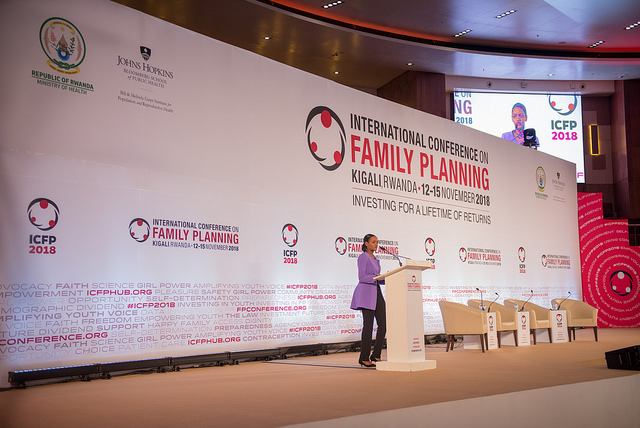Kigali, Rwanda (14 November 2018) – Young family planning advocates from around the world called on global leaders to invest in quality, youth-friendly sexual and reproductive health services, sharing their personal experiences and beliefs, on the second-to-last day of the 2018 International Conference on Family Planning (ICFP). A complete archive of conference live coverage can be found here.
Through monologues and creative storytelling, nearly 30 ICFP Youth Leaders and family planning experts illustrated the barriers young people face trying to prevent unintended pregnancies, including misinformation, stigma and provider bias, stock-outs and high costs. Their stories also explored related topics including sexuality, menstruation and gender equality.
“I have had friends who got pregnant when they were just 16,” said Baye Leinyuy Bongla, an ICFP youth leader and medical doctor from Cameroon. “This experience changes your life completely. We need to start talking [about access to family planning] so fewer girls have to go through bad experiences. Isn’t it wrong to deny a person the ability to make decisions about their body and live a healthy life?”
According to new data released by Guttmacher Institute this month, 36 million young women aged 15–19 in developing regions are sexually active and want to avoid pregnancy, but more than half are not using modern contraceptives. The report notes that roughly half of the 9.6 million pregnancies among this group each year are unintended, and about half of them end in abortion – most of which are unsafe.
“Investing in sexual and reproductive health care that meets adolescents’ needs is critical to ensuring young people are able to make voluntary and informed choices regarding contraception and relationships,” said Dr. Ann Biddlecom, Director of International Research at the Guttmacher Institute. “Young women and men must have access to youth-friendly contraceptive services that include the provision of a wide range of method options, as well as medically accurate counseling and information.”
Youth advocates are on the forefront of this effort, and have implemented creative strategies to eliminate stigma, train providers and overcome barriers young people face in accessing reproductive health services in their local communities. During the plenary, Kokou S. Djagadou, Youth Division representative with the African Union described how as a provider he works to ensure young people have the tools they need to prevent unwanted pregnancy, by fighting against misinformation and addressing societal beliefs about young women’s sexuality.
The plenary closed with a speech from Kojo Lokko, Deputy Director of The Challenge Initiative, about the young women he has met through his work, their hopes for their futures and the role of family planning in realizing these goals.
“My daily work is not about high-level meetings or international conference like this,” said Mr. Lokko. “It’s about empowering girls to ask questions, plan their futures, and access contraception without any fear or judgement.”
Today’s plenary comes on the heels of a two-day ICFP Youth Pre-conference, which gathered more than 500 youth leaders from over 40 countries to exchange resources to support advocacy, research and programs in their home communities. This is the largest contingent of youth leaders in the history of ICFP. The plenary was followed by the 2018 ICFP FPitchfest, a live action competition where youth advocates and CEOs will compete for funding to bring their ideas for transforming the future of family planning to life.
The third day of the 2018 ICFP ends on commitments to actions where FP2020 countries shared their success stories.
“The collaboration of Rwanda Ministry of Health with faith based owned health facilities has played a huge role in sensitization and awareness raising for all [contraceptive] methods with a focus on natural ones while the population in need of modern contraceptives are referred to outreach services”. Said Dr. Felix Sayinzoga, Division Manager at Rwanda Biomedical Center.
Alongside Rwanda, Indonesia, Madagascar and Mozambique shared their progress, lessons learnt and a common challenge on access to FP services to adolescents and young people.
The 2018 ICFP will conclude on November 15th with a final day of programming, focused on progress needed to advance the Family Planning 2020 (FP2020) goals. Sessions and speakers will highlight successful family planning programs at the national and local levels and demonstrate the personal impact these efforts have had on women and girls.



